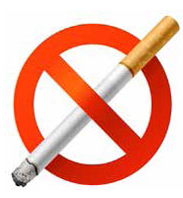Lindiwe Rasasamola was a smoker for 22 years. She kicked the habit last year and says her life has changed for the better.
The reason she started smoking was due to peer pressure and wanting to fit in.
 “As teenager I started singing and entered the entertainment industry. The people around me made smoking seem like a way of life. I think I must have been 14 years old when I took my first puff,” said the 36-year-old, from Turffontein in Gauteng.
“As teenager I started singing and entered the entertainment industry. The people around me made smoking seem like a way of life. I think I must have been 14 years old when I took my first puff,” said the 36-year-old, from Turffontein in Gauteng.
Rasasamola started off smoking four cigarettes a day and before she knew it moved on to about 20 a day.
As the years went by Rasasamola started to feel as if her habit was controlling and consuming her.
“If I did not get a cigarette I would be edgy and short tempered. Eventually I got tired of being dependent on a cigarette. It was time to quit.”
Her breath, nails and hair would also smell of cigarettes, she added.
Rasasamola became more determined to quit smoking after doing a short course when she decided to become a health care worker.
“I got to see people who had cancer as part of my practical and this scared me. I was consumed with regret, wondering why I was smoking but kicking the habit was so difficult. I also thought to myself that I was lucky that I was not sick yet.
“At times I would ask myself what would happen when I am 60 years old. Would I now crawl out of the house just for a cigarette? This made me scared.”
She said quitting was a challenge and for more than a year she thought of what life would be like without a cigarette.
Rasasamola kept the National Council Against Smokers’ (NCAS) details ready for the day she would finally be ready to say goodbye to her cigarettes. That day came on 15 January 2013, when she woke up and made a conscious decision to stop smoking.
“I took the first step when I dialled the number and told the person at NCAS that I didn’t want to smoke but I wanted a cigarette.” She said that the first week was a struggle to get through.
“I would lock myself in the house. I could smell a cigarette from a distance, it was so difficult... I had to deal with withdrawal symptoms. I would cough, choke and at times I couldn’t breathe. I constantly felt sick and I struggled to sleep. The first seven days were a nightmare.”
Despite the initial difficulties, Rasasamola stayed strong and did not turn back.
“I have won my battle against cigarettes and I feel lighter and happier. In my community I have become an advocate against smoking. I know what it can do to you and I know that anyone can quit.”
She encourages every smoker to quit. “Smoking affects your health and spending your life dependent on a cigarette is not a nice way to live,” warned Rasasamola.
With World No Tobacco Day commemorated on 31 May, Vuk’uzenzele asked the NCAS for advice on how to stop smoking.
Tips from the NCAS include:
- Set yourself a date for quitting. On Quit Day throw away your ashtrays, cigarettes and lighter.
- Call the Quit Line on 011 725 1514 for professional advice. Also get support from your family, friends and your doctor. Having someone to talk to helps.
- Find out what triggers your craving for a cigarette – is it stress, alcohol use, etc. Find a way to deal with the triggers.
- If you are craving a cigarette do something to help you cope. Drink water, it will wash the nicotine out of your body. Deep breathe - fill your lungs with air and breathe out slowly. Do this four or five times. It will help you relax. Remember a craving usually lasts for 3-5 minutes before it disappears so take it one craving at a time.
- Start eating healthily. Snack on a carrot, apple, prune, radish or sugarless gum and avoid fatty foods.
- Take it one day at a time. The withdrawal symptoms start to improve after a few days and most disappear within 10 days.
- Be positive and confident that you can quit. If you believe you can, you will succeed.

 Facebook
Facebook Twitter
Twitter WhatsApp
WhatsApp